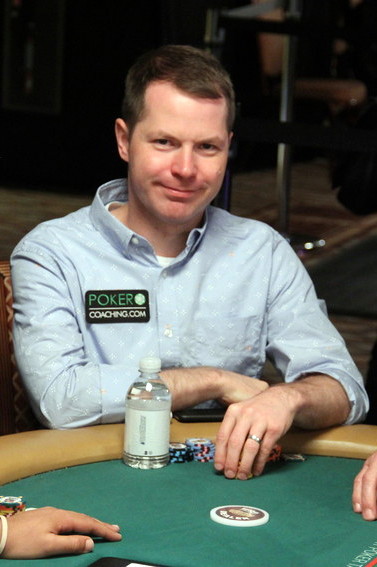






Slow Playing Is Dangerousby Jonathan Little | Published: Jan 10, 2024 |
|
|
 If you want to increase your poker skills and learn to crush the games, check out Jonathan Little’s elite training site at PokerCoaching.com/CardPlayer.
If you want to increase your poker skills and learn to crush the games, check out Jonathan Little’s elite training site at PokerCoaching.com/CardPlayer.
Let’s discuss a hand from a $200 buy-in tournament that one of my students recently played that illustrates the dangers of slow playing. So far, everyone at the table had been fairly tight and passive. No one was too crazy.
Everyone folded to our Hero in third position at a nine-handed table and he raised to 375 out of his 9,000 effective stack at 75-150 with K Q
Q . The cutoff and button both called, and the blinds folded.
. The cutoff and button both called, and the blinds folded.
When you raise and do not get three-bet (re-raised), it is usually safe to assume that you are not against premium preflop hands, like Q-Q and A-K. Instead, you are likely against marginal pairs, non-premium big cards, suited aces, and suited connectors.
The flop came Q 5
5 4
4 , giving Hero top pair with a backdoor flush draw. He bet 600 into the 1,350 pot.
, giving Hero top pair with a backdoor flush draw. He bet 600 into the 1,350 pot.
When you bet for value, make a point to choose a size that can realistically get called by worse made hands.
On this board, if Hero bets large, perhaps 1,200 or more, his opponents will usually only call with top pairs and strong draws. Since his top pair is only in marginal shape against that strong range, a large bet is not ideal. If he bet smaller, as he did, many made hands that he crushes can call, such as 7-7 and 6-5, allowing him to extract value.
Both the cutoff and button called. The turn was the 10 , giving Hero a flush draw in addition to his top pair. He bet 1,000 into the 3,150 pot.
, giving Hero a flush draw in addition to his top pair. He bet 1,000 into the 3,150 pot.
Again, Hero’s bet is purely for value. If he happens to be behind, he may river the flush.
Surprisingly, the cutoff raised to 3,000, and the button folded.
At this point, the cutoff probably has a premium hand, perhaps two pair and better, plus a few premium draws such as K J
J . Although Hero is likely beat at the moment, calling with a flush draw makes sense due to the pot odds plus the implied odds.
. Although Hero is likely beat at the moment, calling with a flush draw makes sense due to the pot odds plus the implied odds.
Hero has to put in 2,000 more to win the 7,150 pot, plus the 2,000 he would be putting in, meaning he needs to win at least 2,000/9,150 = 21% of the time to justify calling.
Notice that in the worst-case scenario, when his opponent has a set, Hero will only win 18% of the time, making this call slightly unprofitable. But if his opponent does not have a set, his call is immediately profitable.
Also notice that even if his opponent happens to have a set, Hero will likely be able to win a sizable bet on the river when he improves to a flush, meaning he is risking 2,000 to win the 7,150 pot plus an additional 5,925 (the remaining stacks) on the river.
Hero called 2,000 more. The river was the A , completing his flush. He decided to lead all-in because he feared that his opponent would check behind with two pair or a set on this “obviously” scary river, while he would still call a bet because the obvious flopped flush draw missed. Hero was pleased to see his opponent instantly call with three fours.
, completing his flush. He decided to lead all-in because he feared that his opponent would check behind with two pair or a set on this “obviously” scary river, while he would still call a bet because the obvious flopped flush draw missed. Hero was pleased to see his opponent instantly call with three fours.
So, where did the cutoff go wrong? He should have simply raised Hero’s flop bet. When you flop a set on a draw-heavy board, you should be happy to build a pot. Instead, the cutoff elected to make a small raise on the turn, forcing Hero to continue with all his draws. This time, his error cost him his tournament life.
If you want more resources to help you improve your game, I put together a course called The 25 Biggest Leaks and How to Fix Them. This course is completely free inside Card Player Poker School!
When you join the Card Player Poker School (it’s free to join), you’ll also get:
 Jonathan Little is a two-time WPT champion with more than $7 million in live tournament earnings, best-selling author of 15 educational poker books, and 2019 GPI Poker Personality of the Year. If you want to increase your poker skills and learn to crush the games, check out his training site at PokerCoaching.com/cardplayer.
Jonathan Little is a two-time WPT champion with more than $7 million in live tournament earnings, best-selling author of 15 educational poker books, and 2019 GPI Poker Personality of the Year. If you want to increase your poker skills and learn to crush the games, check out his training site at PokerCoaching.com/cardplayer.
Features
Tournaments
Strategy